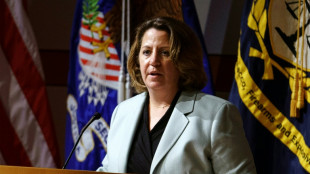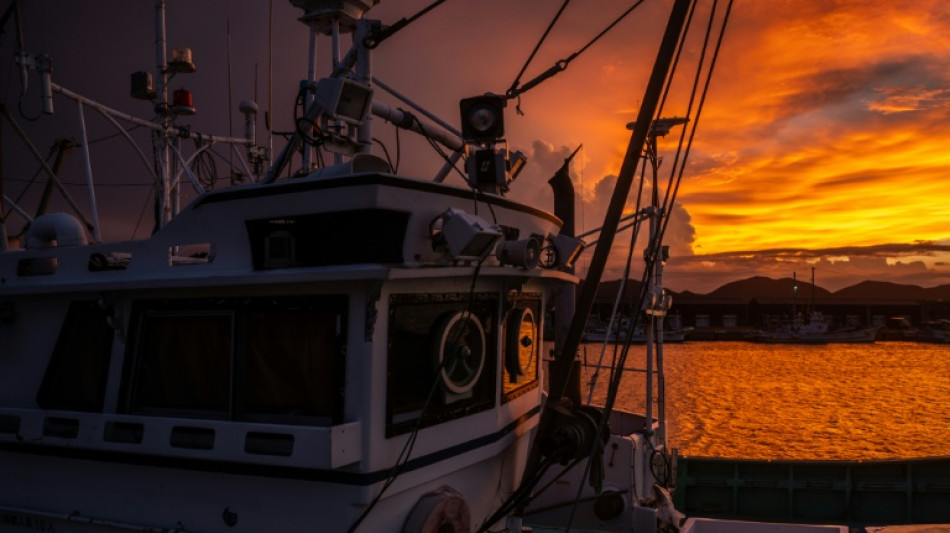
-
 Moldovans torn between pro-EU and pro-Russia vote in tense polls
Moldovans torn between pro-EU and pro-Russia vote in tense polls
-
Strings of identity: Kashmir's fading music endures
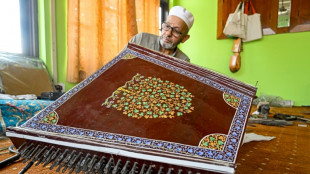
-
 'Clog the toilet' trolls hit Indian visa holders rushing to US
'Clog the toilet' trolls hit Indian visa holders rushing to US
-
Bradley: USA Ryder Cup disaster part of why crowds angry
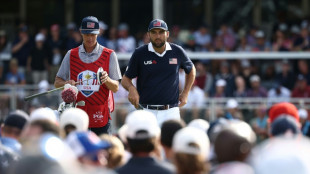
-
 Europe used 'anti-fragile mentality' to cope with Cup hecklers
Europe used 'anti-fragile mentality' to cope with Cup hecklers
-
Unbeaten McIlroy faces winless Scheffler in Ryder Cup singles

-
 Sweeping UN sanctions return to hit Iran after nuclear talks fail
Sweeping UN sanctions return to hit Iran after nuclear talks fail
-
Messi, Miami frustrated in Toronto stalemate

-
 Argentina protesters march for victims of live-streamed femicide
Argentina protesters march for victims of live-streamed femicide
-
Europe shrugs off intense abuse to reach brink of Ryder Cup win

-
 Injury-hit PSG reclaim Ligue 1 top spot ahead of Barcelona clash
Injury-hit PSG reclaim Ligue 1 top spot ahead of Barcelona clash
-
Understrength PSG reclaim Ligue 1 top spot ahead of Barcelona clash

-
 Argentina protesters seek justice for victims of live-streamed femicide
Argentina protesters seek justice for victims of live-streamed femicide
-
Palhinha rescues point for Tottenham against winless Wolves

-
 Springbok Feinberg-Mngomezulu an 'incredible talent' - Erasmus
Springbok Feinberg-Mngomezulu an 'incredible talent' - Erasmus
-
Mitchell backs England to sustain dominance after World Cup triumph

-
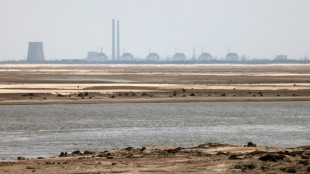 Zaporizhzhia nuclear plant off grid; Russia, Ukraine trade blame
Zaporizhzhia nuclear plant off grid; Russia, Ukraine trade blame
-
McIlroy fires back at hecklers in intense Ryder Cup atmosphere

-
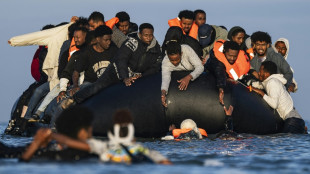 Two women die trying to cross Channel from France
Two women die trying to cross Channel from France
-
Huge Berlin protest urges end to Gaza war

-
 Liverpool 'deserved' defeat to Crystal Palace, says Slot
Liverpool 'deserved' defeat to Crystal Palace, says Slot
-
Bottega Veneta shows off 'soft functionality' in Milan

-
 Maresca blasts careless Chelsea after Brighton defeat
Maresca blasts careless Chelsea after Brighton defeat
-
Juve miss out on Serie A summmit with Atalanta draw

-
 Guardiola salutes dynamic Doku as Man City run riot
Guardiola salutes dynamic Doku as Man City run riot
-
Russia warns West as Ukraine secures Patriot defenses

-
 Ten-man Monaco miss chance to retake top spot in Ligue 1
Ten-man Monaco miss chance to retake top spot in Ligue 1
-
Feinberg-Mngomezulu scores 37 points as Springboks top table

-
 Trump authorizes 'full force' troop deployment in Portland
Trump authorizes 'full force' troop deployment in Portland
-
Matthews at the double as England beat Canada to win Women's Rugby World Cup

-
 Real Madrid 'hurting', deserved to lose derby: Alonso
Real Madrid 'hurting', deserved to lose derby: Alonso
-
Handshake spat bad for cricket, says Pakistan captain ahead of India final

-
 England beat Canada in Women's Rugby World Cup final
England beat Canada in Women's Rugby World Cup final
-
Hezbollah says it refuses to be disarmed one year after leader's killing

-
 Atletico thrash Liga leaders Real Madrid in gripping derby
Atletico thrash Liga leaders Real Madrid in gripping derby
-
Liverpool's perfect start ended by Crystal Palace, Man Utd beaten at Brentford

-
 Unbeaten Rahm sparks Europe to historic five-point Ryder Cup lead
Unbeaten Rahm sparks Europe to historic five-point Ryder Cup lead
-
Dortmund keep heat on Bayern with Mainz win

-
 Under-fire Amorim accepts criticism as Man Utd crash at Brentford
Under-fire Amorim accepts criticism as Man Utd crash at Brentford
-
Sweeping UN sanctions loom for Iran after nuclear talks fail

-
 Canadian Vallieres pulls off cycling world title surprise in Kigali hills
Canadian Vallieres pulls off cycling world title surprise in Kigali hills
-
Dakuwaqa outshines Bielle-Biarrey as Stade Francais beat Bordeaux-Begles

-
 West Ham hire Nuno to replace sacked Potter
West Ham hire Nuno to replace sacked Potter
-
Amorim under pressure as Brentford stun Man Utd

-
 New Zealand too strong for France in Women's Rugby World Cup bronze final
New Zealand too strong for France in Women's Rugby World Cup bronze final
-
West Ham sack Potter, Nuno tipped to take over
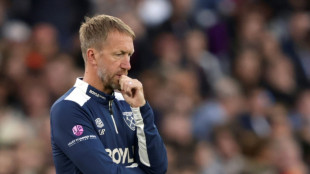
-
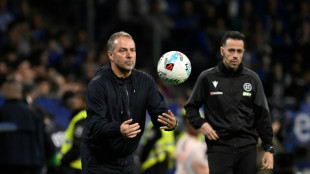 Barca's Flick backs 'fantastic' Szczesny, confirms Yamal return
Barca's Flick backs 'fantastic' Szczesny, confirms Yamal return
-
US to revoke Colombian president's visa over 'incendiary actions'
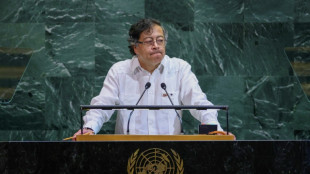
-
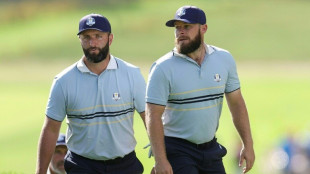 Europe goes back to dominant duos as Ryder Cup resumes
Europe goes back to dominant duos as Ryder Cup resumes
-
West Ham sack Potter, Espirito Santo tipped to take over
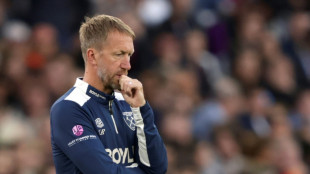

Startups show off ocean-preserving tech at Paris trade fair
Harnessing ocean currents to boost fuel efficiency of vessels, or tracking whales using sensor data and AI -- startups at Paris trade fair Vivatech have been showing off the latest innovations aimed at protecting the environment.
Recently developed AI programs capable of learning from vast datasets have boosted projects trying to understand and predict real-world phenomena, several company founders told AFP.
"We have to use AI because in the natural world there are too many variables" to deal with manually, said Emily Charry Tissier, a biologist and founder of Canadian startup Whale Seeker, which is developing technology to track sea mammals.
Powered by "neural network" systems that ape the functioning of the human brain, the learning systems behind today's AI models "can calculate a weather forecast 1,000 times faster than a standard digital model running on a supercomputer", agreed oceanographer Alexandre Stegner.
He flagged an AI model developed by his firm, Amphitrite, that he said could predict ocean currents by crunching "several layers of satellite data corresponding to different physical variables".
It can forecast currents up to 10 days in advance, he said, offering sea captains "a simple way to save fuel" by slightly changing course and using currents to gain a speed boost of up to four knots.
That could save operators money on fuel, reduce the carbon emissions from shipping, and avoid the classic solution of telling sea captains to reduce their speed.
- Global protection push -
Technologies like these were being shown off in the halls of Vivatech as the UN Ocean Conference (UNOC) drew to a close hundreds of kilometres to the south in French Mediterranean city Nice.
The conference has pushed a treaty to protect 60 percent of the world's oceans closer to becoming law, with 55 signatures -- just five shy of the number required for its enactment.
New technologies could be "a very good thing" for the oceans, said Andre Abreu, International Affairs Director at the Paris-based Tara Ocean Foundation.
But he warned that innovation should not be harnessed to allow more fish to be caught.
"That would mean shooting ourselves in the foot" on goals like preserving marine biodiversity, he said.
That ambiguity can be seen in technology from OceanEyes, a Japanese startup using AI analysis of satellite data to predict sea conditions.
The company hopes to cut the time fishing boats spend tracking down a catch.
"A big problem in Japan is the efficiency of the fishery operations. Many fishers spend a lot of time searching for fish in the water," said boss Yusuke Tanaka.
With less fuel burnt, operators will save money and greenhouse emissions can be slashed.
Anticipating concerns about overfishing, OceanEyes said it also aimed to help vessels comply with recently updated Japanese regulations that oblige fishers to "ensure sustainable use of marine resources".
- 'Can' vs 'should' -
Whale Seeker's Tissier said technology could be used in a considered way to find sustainable solutions.
"I'd like the market to recognise its own limits -- not the limits of what we can do, but what we should do," she told AFP.
That attitude pushed her to refuse to work with a company that wanted to use whale detection to identify nearby fish to catch.
But startups cannot grow without funding and, in the context of oceans, investments are likely to come from big firms keen to make a saving -- from fishing and ship management companies to haulage and logistics giants.
This could well limit their ability to stand on principle.
Stegner called for "regulations that would push the maritime sector to reduce carbon emissions".
But Charry Tissier said the initiative could come from business.
"Technology is developing so much faster than regulation... what I'd like is for big companies to decide for themselves to be responsible," she said.
F.Wagner--VB

